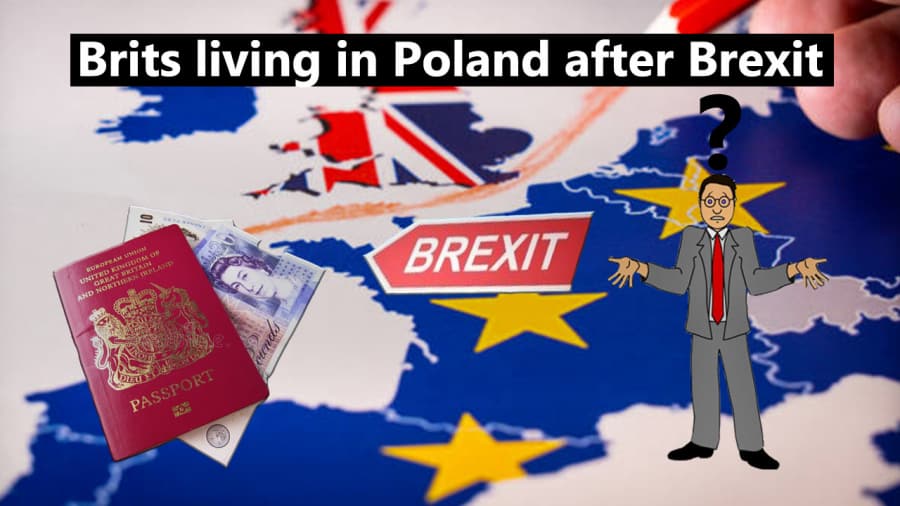This time around, I briefly reflect on how changes to EU law, as well as the rules of residence and work in Poland, affected Brits living in Poland after Brexit.
What was the ‘transition period’, and how did it affect British citizens living in, or travelling to, Poland?
The UK formally left the European Union on 31 January 2020.
On February 1, an 11-month transition period came into force. Ending on 31 December 2020, this transition period was essentially a standstill period intended to uphold the legal status quo while the UK and the EU negotiated additional arrangements.
During the transition period, UK nationals were free to travel into Poland for any purpose and to undertake any work or business activities on the same terms as citizens of Poland. These rules also applied to all other remaining EU countries.
What was the Withdrawal Agreement, and how did it protect Brits living in Poland before the transition period ended?
In the English language, at least, the Withdrawal Agreement (WA) is a 177-page PDF document.
This Agreement set out the arrangements for the withdrawal of the United Kingdom of Great Britain and Northern Ireland (“United Kingdom”) from the European Union (“Union”) and from the European Atomic Energy Community (“Euratom”).
Essentially, the Withdrawal Agreement safeguarded the residency rights of EU citizens living in the UK, as well as the one million or so UK nationals in EU countries, at the end of the transition period.
Citizens’ rights: Who was covered?
- EU citizens who were residing in the UK, and UK nationals who were living in one of the 27 EU Member States at the end of the transition period
- Family members who’d been granted rights under EU law (current spouses and registered partners, parents, grandparents, children, grandchildren and a person in an existing durable relationship), who did not yet live in the same host state as the EU citizen or the UK national, were guaranteed the right to join them in the future
- Children gained protection, wherever they were born, before or after the UK’s withdrawal
- Frontier workers and frontier self-employed persons were also protected in the countries where they were working
What about the rules regarding the residency rights of Brits living in Poland during the transition period?
In accordance with the rules regarding the residency rights of UK citizens and the members of their families on the territory of Poland throughout the transition period, they were not issued with residence permits and residence cards, provided under the Act of 12 December 2013 on Foreigners, as prescribed in the Polish Journal of Laws.
UK citizens were obliged to register their stay as an EU citizen. The authorities issued a certificate.
During the transition period, family members could apply for the following documents issued under the existing rules:
- an EU citizen’s family member residence card
- an EU citizen’s family member’s permanent residence card.
After five years of continuous residence, a resident of the United Kingdom has the right to apply for a document confirming the right of permanent residence.
What bureaucratic obligations did Brits living in Poland after Brexit and the transition period encounter?
UK citizens and their family members with a valid right to stay in Poland before 1 January, 2021, and who continued to live in the country after that date, were considered beneficiaries of the WA. They did not lose their entitlement to live and work in Poland.
From the beginning of 2021, UK citizens and their family members living in Poland had to submit applications for new residence documents (pobytowych dla beneficjentów Umowy Wystąpienia). The purpose of these new documents was to show that they’d been issued in accordance with the WA.
The possibility to replace residence permits issued before the end of 2020 remained open only up to 31 December, 2021. Applicants who submitted their application by 31 December, 2021, received an application certificate valid for 12 months. This certificate effectively serves as a temporary residence permit.
Beneficiaries of the WA were urged by the authorities to obtain new residence documents. Holding such documents facilitated the use of the rights of the beneficiary of the WA when crossing borders and during one’s stay in Poland.
UK citizens entering Poland after the end of the transition period
The general rules on entering and residing in Poland relating to third-country nationals apply to UK nationals and their family members who enter Poland after the end of the transition period.
UK citizens are exempt from the visa requirement for short stays in the Schengen area. In line with Regulation (EU) 2018/1806, the short-term stay shall not exceed 90 days in any 180-day period.
UK nationals and their family members are now subject to border control procedures carried out by Poland’s Border Guard. Their passports are stamped when arriving in and leaving Poland. This makes it possible to calculate the 90-day stay under the visa-free regime.
January 1, 2022, and beyond
First of all, Brits who didn’t submit an application for a residence document under the WA by December 31, 2021, have nothing to fear in terms of their residence rights, providing that they continued their stay in Poland after the end of the transition period.
As of January 1, 2022, United Kingdom nationals and their family members who received their residence documents before the end of the transition period i.e. until 31 December, 2020, (certificate of registration of residence of an EU citizen, a document confirming the right of permanent residence, a residence card of an EU citizen’s family member and a permanent residence card of an EU citizen’s family member), can submit new applications in these matters. Indeed, they can make applications just like UK citizens and their family members who were beneficiaries of the WA, but who did not obtain the above-mentioned residence documents by the end of the transition period, i.e.:
- an application for registration of residence (for UK citizens who are beneficiaries of the Withdrawal Agreement)
- an application for a document confirming the right of permanent residence (for UK citizens who are beneficiaries of the Withdrawal Agreement)
- application for a residence card (for a family member who is not a UK citizen)
- application for a permanent residence card (for a family member who is not a UK citizen).
Summing up – Brits living in Poland after Brexit
As of December 1, 2021, around 3,700 Britons living in Poland applied for a residence permit through the simplified application program. Around 6,500 Britons live in Poland.
Frankly, reading Polish legislation aimed at ensuring the application by the Republic of Poland of the Withdrawal Agreement with regard to the residence rights of UK citizens made my head spin.
Probably, there are a few thousand Brits whose heads have been spinning since the transition period was agreed between the UK and the EU. Perhaps they prefer to take a laissez faire approach to their residency in Poland.

